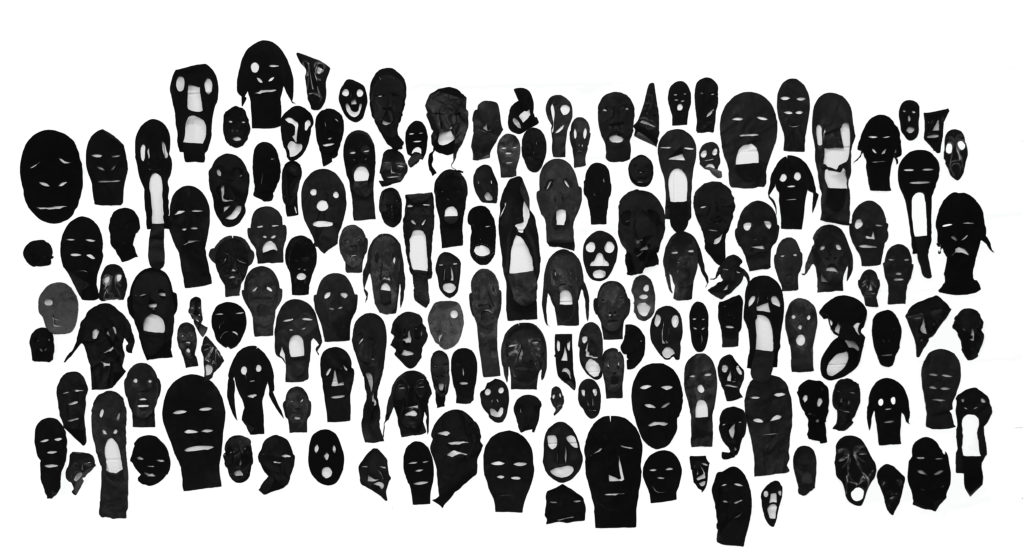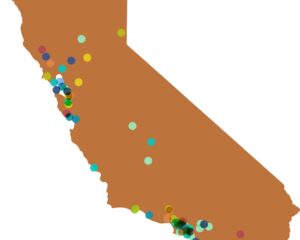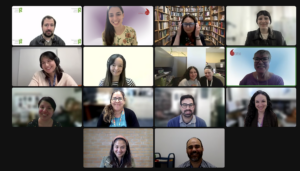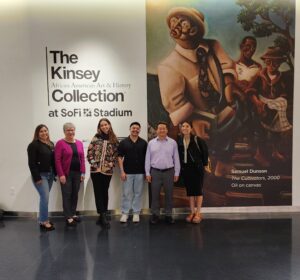The California Humanities’ Project Grant program, a branch of our Humanities for All grant line, offers funding (between $10,000 and $20,000) awarded twice a year for larger public humanities projects of up to two-years duration from the award date.
Projects Awarded December 2020
Note: In this round of Humanities for All Project Grant awards, California Humanities designated specific funding for the area of Youth Voices. These projects involve teens as primary program participants or audiences, and address topics or subjects of interest to them (denoted by “*”).
Blues in the City
Yerba Buena Arts and Events, San Francisco (Bay Area)
Marcus Shelby, Project Director, $10,000
Yerba Buena Gardens Festival (YBGF) Resident Artist Marcus Shelby will develop and present “Blues in the City”, a series of six programs that will put a spotlight on how San Francisco’s most vulnerable lives — the homeless, the poor, and the BIPOC communities — have been drastically impacted by the COVID-19 pandemic. Leveraging his expertise as both an educator and a composer, Shelby will use both lecture and live music to foster greater understanding among people and inspire civic participation. Guest speakers will explore the COVID-19 pandemic through the lens of homelessness, structural racism, and socio-economic inequity, while guest musicians will perform excerpts from new work that has been created in response to the COVID-19 pandemic. This educational series beginning in Fall 2021 will be co-presented by YBGF, the Museum of the African Diaspora, and the Community Music Center. All programs will be admission-free, ADA accessible, and open to the public.
Humanities in Los Angeles *
Humanities in Los Angeles, Los Angeles (LA Region)
Andrea Quaid, Project Director, $10,000
Humanities in the City will host Humanities in Los Angeles: a dynamic, multifaceted project that includes Youth Workshops, a Public Lecture Series, and an Exhibition and Publication. The project activates experiential humanities learning for youth participants and multigenerational audiences, showcasing the ways interdisciplinary inquiry can shape individual and public life. Youth Workshops provide learning experiences for students from Los Angeles public high schools. All public programming invites participants into dialogue, critical and imaginative thinking, and collaborative knowledge-making. Partners are the Edendale Branch Library, California State University, Los Angeles English Department, Poetic Research Bureau, and Women’s Center for Creative Work. Programming will begin in June 2021.
Judith F. Baca: Memorias de Nuestra Tierra, a Retrospective
Museum of Latin American Art, Long Beach (LA Region)
Gabriela Urtiaga, Project Director, $20,000
This project encompasses an 11,000-sq. ft. exhibition of over 110 works presented in three galleries, a robust public programming schedule, numerous K-12 educational activities and a 200-page publication cataloguing Baca’s work, an internationally renowned Los Angeles-based Chicana muralist and activist, with scholarly essays written by MOLAA’s Chief Curator and the project’s Humanities Advisors. The exhibition, the first comprehensive survey on the artist, will feature an immersive mural installation using 3-D mapping technology, photography, and video. A Community Education Series, led by practicing artists, educators, and humanities experts, will provide interactive humanities learning experiences, both free and fee-based, to engage students, families, educators, and the general public. Slated to open at the Museum of Latin American Art (MOLAA) in July 2021, the exhibition will subsequently travel to one or more U.S. venues, with conversations now in progress with the Smithsonian.
Kumeyaay Comics: Indigenous Histories of California *
Campo Band of Missions Indians (Campo Kumeyaay Nation), Campo (San Diego Metro Region)
Michael Connolly Miskwish, Project Director, $20,000
Launching in May 2021, the Kumeyaay Comics project responds to the need for more accurate and Indigenous-centered accounts of California history. Initiated by California tribal members and executed in collaboration with a team of humanities advisors from NAGPRA Comics, the project will create a series of comic book-format tribal histories that will make use of history, cultural anthropology, and the arts to increase understanding and access to Indigenous histories and perspectives. The rigorously researched series, both authored and vetted by members of the community, will be published electronically and made available for free use by local newspapers or as exhibit panels in schools and cultural centers, supplemented with lesson plans for classroom use. Printed copies of the comics will be available through Tribal Print Source, a tribally owned publisher in California. A traveling exhibit will also be produced that will launch at the San Pasqual Cultural Center in Escondido.
The Land of Milk and Honey
California State University San Bernardino Philanthropic Foundation, San Bernardino (Inland Empire Region)
Edward Gomez, Project Director, $20,000
The Land of Milk and Honey is a series of multi-disciplinary and multi-lingual traveling arts and culture programs presented by The MexiCali Biennial in conjunction with partnering institutions based in the Inland Empire, the Monterey Bay region, the Imperial Valley and along the California/Mexico border. Drawing inspiration from the writing of John Steinbeck, this program seeks to provide a broad range of audiences throughout the state with a comprehensive look at California agriculture, past and present. Through exhibitions, panel discussions, film screenings, music programs and community-based interactive projects, artists, academic experts, writers and culture bearers will explore foodways, ecology and food security. Special topics include the Bracero program and its legacy, the global impact of migrant workers, the symbiotic relationship between the US and Mexico, the rise and legacy of the United Farm Workers, the importance of land in the Mexican Revolution, and the history and legacy of immigration in our state. Local partners will assist with outreach to engage underserved communities who will be interested in these subjects, along with the general public, and accessibility will be expanded through multilingual programming.
Reclaiming Our Space (ROSe)
Filipino-American Development Foundation on behalf of South of Market Community Action Network (SOMCAN), San Francisco (Bay Area Region)
Angelica Cabande, Project Director, $20,000
Led by the San Francisco South of Market Community Action Network (SOMCAN), Reclaiming Our Space (ROSe) is a multifaceted project that draws on the humanities, art, urban design and community planning to organize, empower, and strengthen the South of Market Street (SOMA) community and SOMA Pilipinas Cultural District. Conceived by arts curator and writer Lian Ladia, the project will engage 15 participants in researching and thinking about art, design, and urbanity over a 10-week series of socially distanced online workshops, writing/visual research activities with site visits, and publicly accessible lectures of guest speakers from multiple humanities and arts disciplines. ROSe plans to document the project through a publication that will provide a long-term resource for current and future SOMCAN partners, including the San Francisco Municipal Transportation Agency, Planning Department and Department of Public Works.
Securing Justice: The Ethics and Lived Experience of California Housing Insecurity
Cal Poly Pomona Foundation, Pomona (Los Angeles Region)
Brady Collins, Project Director, $20,000
The theme of “housing insecurity” will anchor a series of panel discussions and podcasts launching in January 2021, organized by the California Center for Ethics and Policy (CCEP) at Cal Poly Pomona. The panel series developed collaboratively by students, faculty, field researchers and practitioners, provides a platform for experts from a variety of academic and artistic disciplines and local advocates to discuss different topics related to housing insecurity, including the impact of COVID-19 and housing segregation. Podcast episodes, featuring artists, philosophers, and advocates at the forefront of social movements and policy change in the region, will range from interviews and panel discussion to oral histories, performances, and storytelling.
The Black Index*
Regents of the University of California Irvine, Irvine (Orange County Region)
Bridget Cooks, Project Director, $20,000
The exhibition presents visual strategies that contest the overwhelming number of photographs of Black people as victims of violent crimes that are circulated with such regularity that they no longer refer to the persons they depict. Instead, the photographs mark Black death as a normal, monotonous, unremarkable non-event. The Black Index artists ––Dennis Delgado, Alicia Henry, Kenyatta A.C. Hinkle, Titus Kaphar, Whitfield Lovell, and Lava Thomas –– create new synapses, perceptive inroads into conceiving Black death as loss to be mourned and remembered. Their art argues for recognition of lives that existed in the full complexity of form and spirit. The Black Index will debut at UC Irvine in January 2021, before traveling to the Palo Alto Art Center, Black Studies Galleries at the UT, Austin, and Hunter College in New York. A robust series of related public programs during the California installations consists of artist talks, a summer camp and workshops for East Palo Alto youth, and lifelong learning programming for adults.
Project Wild Edges
Miners Foundry Cultural Center, Nevada City (Sierra Region)
Lisa Barker and Jenny Hale, Project Directors, $20,000
“Wild Edges” is a new site-specific interactive, multimedia theater work exploring the intersection of nature and culture in California’s Sierra. Presented alongside the Wolf Creek Trail which runs behind a rural shopping strip in Grass Valley, the project will provide a platform to share the voices and perspectives of historians, First Peoples, ecologists, and current land managers, who have all had a presence and impact on this site, which is itself the product of a natural disaster. Performances in fall 2022 will invite audiences to reflect on a number of questions: What values have we held as a society that have informed our land management practices, and are they serving us today? How can humans evolve with other species to envision a sustainable world where all may thrive? How can the creative process inspire new connections and possibilities for our rural interface with the wild? Post-performance discussions aim to invigorate civic participation and foster a stronger sense of community.
Woven Lives: Exploring Women’s Needlework from the Italian Diaspora
Historic Italian Hall Foundation, Los Angeles (LA Region)
Marianna Gatto, Project Director, $20,000
The Italian American Museum of Los Angeles will present an interpretive exhibition and associated public programming to examine the largely overlooked topic of needlework in the Italian migratory experience. Long considered an essential domestic skill that was passed down from generation to generation, needlework assumed new importance following immigration to the United States, providing a vital source of income. Although immigrant women continued to practice this tradition in their private lives, their daughters overwhelmingly rejected the cultural expectation to sew. Its transmission interrupted, needlework was relegated to heirloom status, gained new cultural meanings, and became a metaphor for the immigrant experience before being rediscovered and preserved. In addition to highlighting the cultural practices and experiences of Italo Californian women, the exhibition and programs will draw parallels to other immigrant groups, past and present, to promote cross-cultural understanding and appreciation of our collective cultural heritage. Special programs and other efforts to strengthen accessibility will promote cultural equity and inclusion for museum visitors, as well as provide an opportunity for people of diverse backgrounds to engage in dialog and collaborative art making and the sharing of stories and traditions.
Learn more about the Humanities for All Grant Program here.
Read the full press release here.
About California Humanities:
California Humanities, a nonprofit partner of the National Endowment for the Humanities, promotes the humanities—focused on ideas, conversation and learning—as relevant, meaningful ways to understand the human condition and connect people to each other in order to help strengthen California. California Humanities has provided grants and programs across the state since 1975. To learn more, visit calhum.org, or like and follow on Facebook, Twitter, and Instagram.
###





